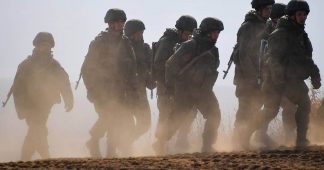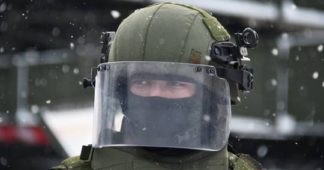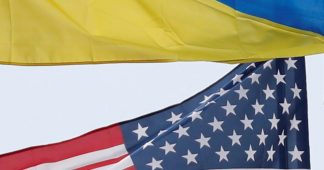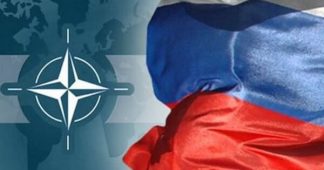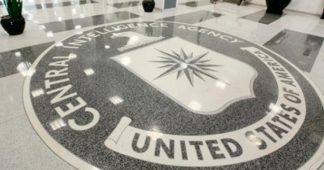Posted on
Was Monday’s hyperactivity mostly theater? The Pentagon raised the alert status of 8,500 troops reportedly to bolster NATO’s Quick Response Force, while emphasizing that no final decision had been made to deploy them. And NATO announced that some members were sending ships and fighter jets to Eastern Europe to reassure allies in the region.
Adding to the tension, the State Department ordered the families of diplomats to depart from the embassy in Kyiv, with the families of Britain and Australia tagging along close behind. At the same time, the EU’s top diplomat, Josep Borrell, was unusually direct in saying: “We are not going to do the same thing [scale down embassies], because we don’t know any specific reasons.”
Meanwhile, the corporate media is in even higher dudgeon denouncing Russia’s alleged intention to invade Ukraine, despite repeated (and plausible) denials from Moscow that this is the eventual purpose of increased Russian troop strength near Ukraine. It seems the current high tension is being artificially stoked at present, and the question is why.
Let me hypothesize that “the crazies” in Washington, who see political advantage in brinkmanship vis-à-vis Russia, are making a last-ditch effort to pre-empt meaningful progress in the U.S.-Russia negotiations now under way – yes, the talks “everyone knew” would quickly fail. The hawks may feel a particular urgency now, since NATO solidarity is taking on the veneer of a Potemkin village, with Germany, the key odd-man-out, refusing to send weapons to Ukraine.
Officials Tightlipped: Good Sign
Following the initial U.S.-Russia talks in Geneva on (9/10 Jan.), there was an abundance of reporting, much of it sourced to the officials involved. After a few days, though, that abruptly stopped, probably by mutual agreement not to complicate negotiations by having to deal with media reporting – accurate or not. The only noteworthy exception was an interview given by Kremlin spokesman Dmitry Peskov who has been very close to President Putin for many years. On Jan. 16, Peskov appeared on “Fareed Zaharia GPS” to talk about “Russia’s demands”.
PESKOV: I officially can tell you that there are no Russian troops … on Ukrainian soil. But there are Russian troops on the territory of the Russian federation next to Ukrainian borders. And we find it necessary to keep those troops there [because of] the very tense situation and very unfriendly environment created by various training of NATO, jet fighters, NATO spy planes, NATO’s military infrastructure moving towards our borders. We have to respond. … That’s why we have our military guys on our territory there.
ZAKARIA: Do you have some kind of a timeline that you are – at which point you will then say the negotiations have failed and are you then prepared to take military action?
PESKOV: No one is threatening anyone with military action. This will be just a madness to do that. But we will be ready to take counteractions. So if you continue to say “Listen, Russians, we’re not going to take into account your concerns, NATO will continue to expand … we’re not going to say that we will not deploy any offensive weapons on Ukraine’s territory. …” If you tell us that, we will have to do something. [Emphasis added.]
What is the timeline? … Well, of course, we’re not speaking about tomorrow. We’re not speaking about hours, but what was meant by our president is that we don’t want to see a process for the sake of the process. So we don’t want to see a month-long or yearlong negotiation discussing our disagreements. We want to feel for the beginning the readiness to take into account our concerns. Right now unfortunately we fail to do that. [Emphasis added.]
Surprise! Blinken, Lavrov to Geneva
Few expected the announcement on Jan. 18 that Lavrov and Blinken would meet on Jan. 21. One can imagine increased apprehensiveness on the part of the neocons, and others who favor tension more than détente, at the unusually rapid continuation of the bilateral negotiations. Worse still, from their point of view, Blinken said he would provide – this week – written comments on Russian concerns.
THE Question: Did someone on the U.S. side take Peskov seriously?
The official silence was briefly broken by Blinken on the (Jan. 23) Sunday TV talk shows. Blinken told Face the Nation, for example, that the path of diplomacy and dialogue is clearly the most responsible thing to do.
“We are answering some of the concerns Russia may have, Russia is answering the many concerns that we have. … We’ll see if … there are things we can do again on a reciprocal basis that would actually advance collective security in a way that answers some of what we are hearing [from Russia], and Russia answering a lot of what Russia is hearing from us.” (To no one’s surprise, in order to balance his remarks, Blinken included the obligatory warnings of “massive consequences” if Russia invades Ukraine.) [Emphasis added.]
The Written Response
Unless the neocons and their Ukrainian proxies manage to disrupt the process, the next step will be the US response to what Russia has put on the table. One encouraging sign comes unofficially from Russian media reports that Blinken told Lavrov that when the US response is handed over, the US does not want the contents released to the media. Political commentator and popular talk show host Vladimir Solovyov commented that this suggests that the White House does not want the Western press to jump on Biden’s proposals before they can be digested and evaluated by the Kremlin. Seems a good guess.
* Ray McGovern works with Tell the Word, a publishing arm of the ecumenical Church of the Saviour in inner-city Washington. His 27-year career as a CIA analyst includes serving as Chief of the Soviet Foreign Policy Branch and preparer/briefer of the President’s Daily Brief. He is co-founder of Veteran Intelligence Professionals for Sanity (VIPS).
Published at original.antiwar.com
We remind our readers that publication of articles on our site does not mean that we agree with what is written. Our policy is to publish anything which we consider of interest, so as to assist our readers in forming their opinions. Sometimes we even publish articles with which we totally disagree, since we believe it is important for our readers to be informed on as wide a spectrum of views as possible.
